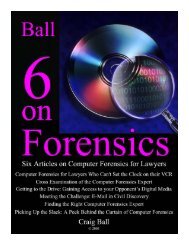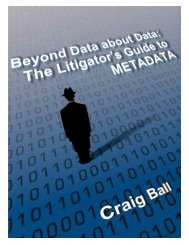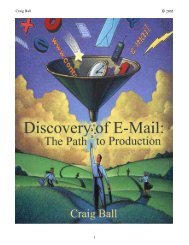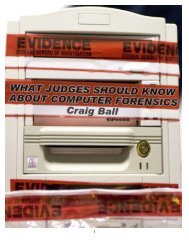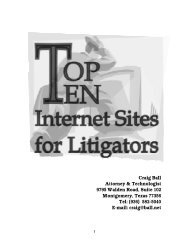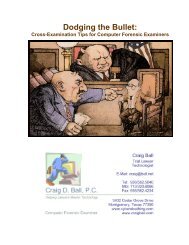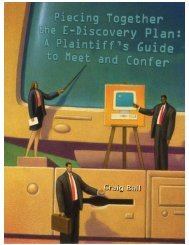Five on Forensics Page 1 - Craig Ball
Five on Forensics Page 1 - Craig Ball
Five on Forensics Page 1 - Craig Ball
Create successful ePaper yourself
Turn your PDF publications into a flip-book with our unique Google optimized e-Paper software.
<str<strong>on</strong>g>Five</str<strong>on</strong>g> <strong>on</strong> <strong>Forensics</strong><br />
© 2002-2008 <strong>Craig</strong> <strong>Ball</strong> All Rights Reserved<br />
19. Be prepared to propose a “claw back” producti<strong>on</strong>, if advantageous.<br />
20. D<strong>on</strong>’t accept asserti<strong>on</strong>s of cost or complexity unless you know them to be accurate.<br />
Have such claims independently evaluated and be ready to propose alternatives.<br />
Twenty Tips for Counsel Defending Against E-Discovery<br />
1. Resp<strong>on</strong>d immediately to any preservati<strong>on</strong> letter and advise what you will and w<strong>on</strong>’t do<br />
without a court order and why. D<strong>on</strong>’t enable your opp<strong>on</strong>ent to later claim, “I thought<br />
they were saving everything I asked for.”<br />
2. Act immediately to preserve potentially relevant data. Know the tape rotati<strong>on</strong> schedule<br />
and decide whether to halt rotati<strong>on</strong> and to what extent. Communicate clearly and<br />
specifically what your client’s employees must do and for how l<strong>on</strong>g. D<strong>on</strong>’t rely <strong>on</strong><br />
intermediaries if data destructi<strong>on</strong> is in the offing. You may <strong>on</strong>ly get <strong>on</strong>e shot to<br />
preserve some things, so d<strong>on</strong>’t just leave a voice mail for some<strong>on</strong>e who’s away <strong>on</strong><br />
vacati<strong>on</strong>. Implement your e-discovery triage plan, and be sure that management gets<br />
behind it unequivocally.<br />
3. C<strong>on</strong>fer with opposing counsel early and often. Document everything you proposed,<br />
agreed or declined to do.<br />
4. Seek a discovery c<strong>on</strong>ference with the court if the retenti<strong>on</strong> or producti<strong>on</strong> obligati<strong>on</strong>s<br />
are <strong>on</strong>erous.<br />
5. Meet with the IT staff and let them help you understand what must be d<strong>on</strong>e to resp<strong>on</strong>d<br />
to a request and whether it can be d<strong>on</strong>e. Have them propose alternatives. Treat them<br />
as “officers of the court” within their digital domain.<br />
6. Prepare IT staff and records custodians for depositi<strong>on</strong>--not just the department head.<br />
Be sure they know the retenti<strong>on</strong> policy and how it has been implemented. Engineering<br />
types tend to look for soluti<strong>on</strong>s, so cauti<strong>on</strong> them against helping your opp<strong>on</strong>ent solve<br />
her problem of getting what she seeks from your systems!<br />
7. “Boomerang” your opp<strong>on</strong>ent’s discovery where advantageous, serving it back <strong>on</strong> the<br />
other side. More importantly, push back with e-discovery. Resp<strong>on</strong>ding to an<br />
electr<strong>on</strong>ic discovery request is a perilous undertaking even when you <strong>on</strong>ly have <strong>on</strong>e<br />
computer (most Americans have more than <strong>on</strong>e). Even if you are Goliath, the David<br />
suing you doesn’t have an IT staff and may be unable to resist the temptati<strong>on</strong> to<br />
sanitize his e-producti<strong>on</strong>. “David” may be no more inclined to share his e-mail with<br />
you than you with him. Moreover, home computers tend to reveal much more than<br />
their office counterparts, so c<strong>on</strong>sider computer forensics as well.<br />
8. Document all efforts to identify resp<strong>on</strong>sive material. Should something be missed and<br />
you need to show good faith, it will take more than a global representati<strong>on</strong> of, “We<br />
looked really hard.” Quantify efforts in bankers’ boxes, gigabytes, man-hours and hard<br />
dollars. This informati<strong>on</strong> will also be useful when seeking to dem<strong>on</strong>strate the burden<br />
imposed by future requests and when seeking to shift costs.<br />
9. When appropriate, seek to shift costs to your opp<strong>on</strong>ent. A credible risk of paying your<br />
client’s bills is a very big hammer, but be sure that the Court doesn’t c<strong>on</strong>fuse cost<br />
shifting with broader access. Just because the opp<strong>on</strong>ent has to pay for the collecti<strong>on</strong><br />
and search effort doesn’t c<strong>on</strong>fer a greater right to see anything.<br />
10. When claiming undue burden, be prepared to attach reas<strong>on</strong>able estimates of time and<br />
m<strong>on</strong>ey to resp<strong>on</strong>sive efforts. Be sure the court understands that employee time isn’t<br />
“free.” Get quotes from outside vendors to support credibility. D<strong>on</strong>’t forget the cost of<br />
<strong>Page</strong> 75



